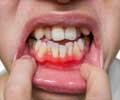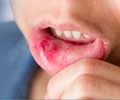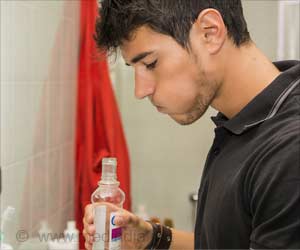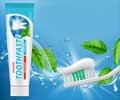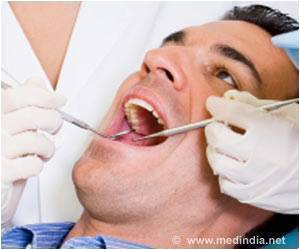- Recent Development of Active Ingredients in Mouthwashes and Toothpastes for Periodontal Diseases - (https://pubmed.ncbi.nlm.nih.gov/33916013/)
- A Fresh Look at Mouthwashes - What Is Inside and What Is It For? - (https://www.ncbi.nlm.nih.gov/pmc/articles/PMC8997378/)
- Mouthwashes - (https://www.ada.org/en/resources/research/science-and-research-institute/oral-health-topics/mouthrinse-mouthwash)
- Mouth sores and ulcers (canker sores) - (https://www.healthdirect.gov.au/mouth-sores-and-ulcers)
- Alcohol-based mouthwash as a risk factor of oral cancer: A systematic review - (https://www.ncbi.nlm.nih.gov/pmc/articles/PMC6982979/)
- Know Your Risk for Stroke - (https://www.cdc.gov/stroke/risk_factors.htm)
About
Imagine starting your day with a burst of confidence, knowing your smile radiates with vitality. This is the promise that toothpaste and mouthwash commercials make, featuring celebrities with their pearly whites shining.
These products assure us of not just a brighter, cleaner smile, but also the assurance of fresher breath, a defense against plaque, and a shield against potential gum issues in the long haul. It's a small step towards a big impact on your daily life.
One of the products that can help you achieve your oral hygiene goals is mouthwash.
It is also known as mouth rinse, is a liquid solution used for rinsing the mouth. It's a valuable addition to oral hygiene routines, providing benefits like fresher breath, reduced bacteria, and improved gum health.
In our pursuit of good oral health, the foundation lies in our daily routine at home. Brushing and flossing, the stalwarts of oral hygiene, form the cornerstone of this regimen. However, for many, keeping up with this routine can be challenging. Inadequate brushing and flossing can lead to the buildup of plaque. To bolster these efforts, mouthwash formulations come into play.
A mouthwash is a water-based solution, not intended for sterilization, but valued for its deodorizing, refreshing, and antiseptic properties. Its primary purpose is to diminish oral bacteria, eliminate food particles, and provide a pleasant, invigorating sensation in the mouth.
Over time, various substances have been employed for mouthwash. In the medieval period, individuals rinsed their mouths with household items like vinegar and rose water. Today, the production of mouthwashes rivals that of toothpaste, underscoring their significance in modern oral care.
Components of Mouthwash
Mouthwashes comprises active and inactive ingredients. Active ingredients include(1✔ ✔Trusted Source
Recent Development of Active Ingredients in Mouthwashes and Toothpastes for Periodontal Diseases
Go to source):
| Agent | Examples | Function |
| Antimicrobials | acetylpyridinium chloride, chlorhexidine, gluconate, sanguinarine, phenolic compounds | Reduce amount of bacteria in the mouth and attack the build-up of plaque on the teeth. Remove tooth-decay causing germs and bacteria from the mouth. |
| Deodorizing and oxidizing agents | sodium bicarbonate and chlorine dioxide respectively | Help to mask and neutralize bad odors |
| Oxygenating agents | hydrogen peroxide | Help in eradicating anaerobic micro-organisms (ones that live in the absence of oxygen) by adding oxygen to the area. |
| Fluoride | sodium fluoride | Strengthens teeth and prevents tooth decay. Often added to water filtration systems and toothpaste as a means of further protection against tooth decay |
| Pain-relieving agents | Anodynes | Provide pain relief. |
| Buffering agents | benzoic acid | Relieve soft-tissue pain, reduce acidity and dissolve build-up of film on the lining of the mouth |
| Anti-tartar agents | zinc citrate | Reduce tartar build-up in the mouth |
| Flavoring agents | eucalyptol or menthol | Flavor the mouthwash to give a pleasant taste in the mouth |
| Preservatives | sodium benzoate | Prolong the stability or the shelf life of the mouthwash and prevent formation of microbes. |
Inactive ingredients: These ingredients are included in the mouthwashes to dilute and sustain the active ingredients (e.g., water, alcohol).
Do you know why flavoring and coloring agents are added to the mouthwash?
One school of thought is that this makes them more appealing to children. But the downside of this is that if the mouthwash has alcohol content, then it would make it dangerous for children.
Hence, it becomes parents’ responsibility to choose the right mouthwash that is alcohol-free for their children.
One issue to be aware of is that many mouthwashes contain alcohol, which has been a controversial issue for various reasons.
The first is that many mouthwashes are manufactured in bright colors, that can mask the antiseptic and alcohol in them(2✔ ✔Trusted Source
A Fresh Look at Mouthwashes - What Is Inside and What Is It For?
Go to source).
Types of Mouthwash
Fluoride Mouthwash
This kind of mouthwash contains fluoride compounds such as 0.05% sodium fluoride, which provides extra fluoride for the individuals who require it. Using it daily can provide extra protection against tooth decay, as fluoride mouth rinse strengthens the teeth and helps prevent decay.
Antiseptic Mouthwash
An antiseptic mouthwash kills bacteria and can also make the breath fresher. Antiseptic mouthwashes are used before and after surgery to eliminate bacteria and prevent infections. This kind of mouthwash is also recommended for some patients with some kind of mouth infection such as gum disease or thrush. Because an antiseptic mouthwash could affect the sense of taste and possibly stain the teeth, individuals should consult a dental professional regarding frequent use, as an antiseptic mouthwash may affect taste perception and potentially stain teeth.
Alcohol-free Mouthwash
Due to recent medical reviews and articles highlighting the negative effects of alcohol on the body and its impact on bad breath treatment, many companies have started producing alcohol-free products. Regular mouthwash can cause a burning sensation in the oral cavity tissue whereas alcohol free mouthwash does not. Alcohol-free mouthwash should be free from chemicals such as benzalkonium chloride (an allergen), sodium lauryl sulfate, saccharin, or alcohol. On the other hand, Instead, it should contain ingredients like sodium benzoate, sodium bicarbonate, and others that effectively eliminate bacteria from the mouth. Alcohol-free substitutes keep the bacteria in check without eradicating them all at once. Alcohol-free mouthwash may be more appropriate for people, especially those who have extensive dental restorations or dry mouth issues.
Anti-plaque Mouthwash
The development of plaque leads to the production of acid, which gradually erodes your teeth. If left untreated for several days, it hardens into tartar, requiring professional removal. Anti-plaque mouthwashes can help to control plaque build-up and prevent gingivitis.
Natural Mouthwash
Natural herbal mouth rinses are composed of plant-based ingredients and typically do not include alcohol, sugar, artificial sweeteners, or artificial colors. Natural mouthwashes use vegetable juices such as red cabbage, purple carrot, beet, tomato and annatto to add color.
They are sweetened with vegetable glycerin, stevia or xylitol, none of which foster bacteria growth. Essential oils like anise, cinnamon, clove, eucalyptus, fennel, lavender, rosemary, and spearmint are used as flavoring agents to refresh breath and reduce bacteria in the mouth.
Antifungal Mouthwash
Candida is a naturally occurring fungus that can lead to a medical condition known as thrush when there is an overgrowth in the mouth. This overgrowth can lead to swelling in the mouth and the development of painful sores. Anti-fungal mouthwash is commonly used to treat this condition, with noticeable improvement typically occurring within a couple of weeks.
Whitening Mouthwash
There is some anecdotal evidence suggesting that using hydrogen peroxide as a mouth rinse, when diluted with at least 50 percent water, can help whiten teeth. However, further research is needed to conclusively support this.
Mouthwash for Kids
Older children who wear braces are particularly good candidates for fluoride mouth rinses because it can help prevent the buildup of acid-producing plaque bacteria, which may occur under the brackets. Young children should avoid using mouthwash due to the risk of swallowing the product.
Children between the ages of 6 and 12 should only use mouthwash under close adult supervision. Children under the age of 6 years should especially avoid fluoride rinses, as excessive fluoride exposure in children can lead to fluorosis, a condition that results in spots or streaks on the teeth(3✔ ✔Trusted Source
Mouthwashes
Go to source).
Benefits of Mouthwash
- Mouthwash reaches back of the mouth and teeth where a toothbrush or floss typically cannot, thus enhances the effects of brushing and flossing.
- Causes a reduction in gingivitis, plaque and other dental and gum problems.
- Combats germs in unreachable areas in the mouth and prevents cavities and tooth decay.
- Loosens and dislodges food debris trapped in between spaces, thereby acting as floss.
- Maintain a balance of bacteria without indiscriminately destroying them.
- A popular product for oral hygiene, mouthwashes come in an assortment of flavors which act as breath fresheners(3✔ ✔Trusted Source
Mouthwashes
Go to source).
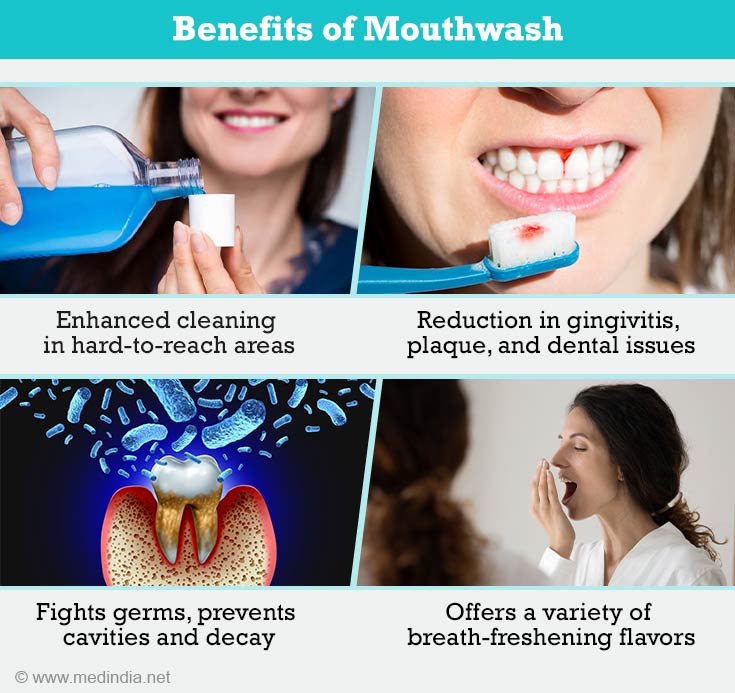
Risks Involved with Mouthwash
Irritates canker sores in the mouth: If the alcohol content of your mouthwash is too high, it may actually end up irritating the canker sore more than helping it(4✔ ✔Trusted Source
Mouth sores and ulcers (canker sores)
Go to source).
Masks bad breath: Mouthwash can lead to fresher breath, but it could be short-lived. It has been seen that if a patient has poor oral hygiene and doesn’t brush effectively, there is no amount of mouthwash which could mask the effects of poor oral health.
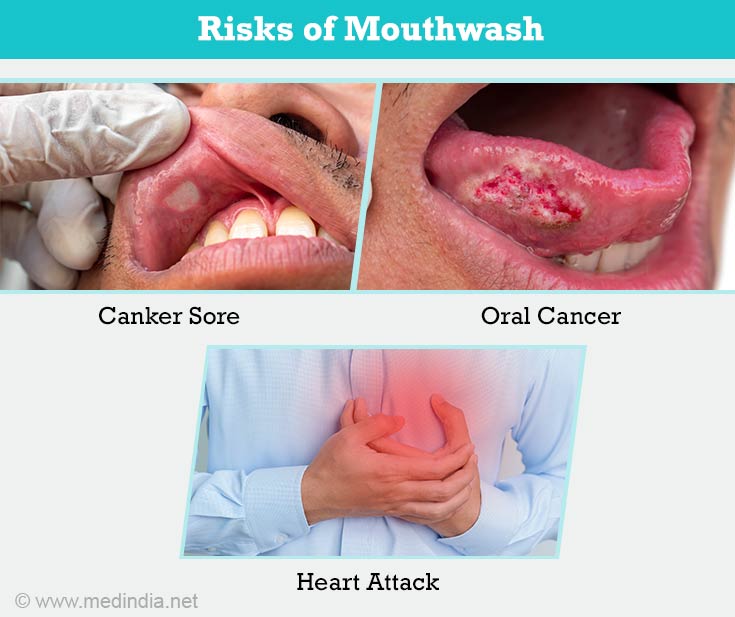
Linked to oral cancer: The issue about alcohol in mouthwash is that some research has suggested that it can be a contributing factor to mouth cancer. Some mouthwashes can contain as much as 25% alcohol and in 2009, The Telegraph newspaper reported on research which concluded that the increased possibility of cancer after using certain types of mouthwashes was four or fivefold(5✔ ✔Trusted Source
Alcohol-based mouthwash as a risk factor of oral cancer: A systematic review
Go to source).
It is also linked to increased risk of stroke and
Know Your Risk for Stroke
Go to source, 3✔ ✔Trusted Source
Mouthwashes
Go to source)
Points to Remember
- Always consult your dentist before using a mouthwash to ensure that there are no other health issues affecting your oral hygiene. For example, if you are using a mouthwash to combat halitosis or mouth ulcers, the mouthwash could simply be masking a more serious, underlying problem.
- People with voice problems should avoid mouthwashes that contain alcohol or other irritating ingredients.
- Licorice is a commonly used herb in the Ayurvedic medicine. Licorice has anti-ulcer and antibacterial properties which are effective to treat mouth ulcers.
- You should always rinse for the amount of time stated on the product no matter what type of mouthwash you choose. Avoid using mouthwash in excess of the recommended amount or frequency.
- Mouthwashes or rinses should not take the place of daily tooth brushing and flossing, which are essential to remove particles of food on and between teeth. In other words, mouthwash should be used after you finish your tooth brushing and flossing routine.
- No mouthwash is capable of killing the bacteria that causes gum disease.
- The use of mouthwash is not recommended for little children especially those below 6 years of age, because these kids are more inclined to swallow the mouthwash instead of spitting them out after rinsing.
- When you walk down the mouthwash aisle in a drug store, choosing the best brand from a vast array of mouthwash brands could be quite a daunting task. Since your dentist deals with teeth on a regular basis, and knows which products will work best for you, be sure to ask for a recommendation at your next scheduled appointment.


